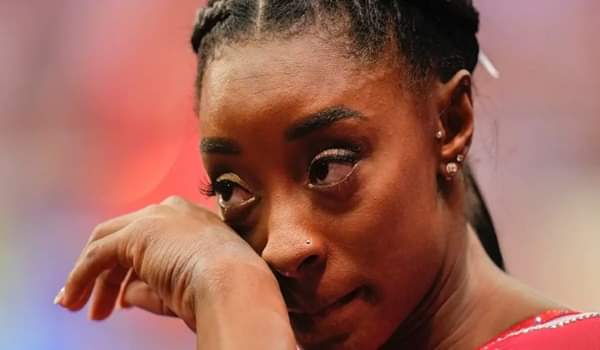CELEBRITY
Emotional moment: PRAY FOR ME AM GOING THROUGH ALOT , As Simone Biles hit on retiring from gymnastics after Paris Olympics

CEOs and athletes have more in common than most people think. Both domains, at the top level, require extensive travel and time away from home and exist within pressure-cooker environments where criticism and scrutiny are relentless. In both fields, there’s an expectation to be almost superhuman, showing no signs of distress or chinks in the armor. With the 2024 Summer Olympics in Paris well underway, many were eager to see top athletes, and one notable return to the spotlight was Simone Biles.
Biles recently won her third gold medal at the Paris Olympics, with several events left to add to her current nine Olympic medals. While her medals and peak performances are noteworthy, her journey to Paris is a valuable reminder for CEOs, founders, and business leaders. In the 2020 Tokyo Games, Biles was favored to win up to six golds and was deemed the “face of the Games.” Instead, she left with two medals (a silver and a bronze). Discussing her experience with NBC’s Mike Tirico, Biles revealed the pressure to perform and her struggle with “the twisties,” a phenomenon where gymnasts experience a disconnect between their mind and body while airborne.
After dismissing it as a fluke, Biles faced it again and didn’t compete in most of her scheduled events. Although she didn’t achieve multiple golds, Biles highlighted the critical mental health issue in high-pressure environments. In business, you can swap out medals for IPOs, key mergers and acquisitions, revenue targets, revitalizing a company, shareholder pressure, public scrutiny, and more. Biles’ journey from the Tokyo Games to Paris highlights two essential lessons for CEOs striving to perform at a high level while preserving their mental health.
Pay Attention to Your Check Engine Lights And Leverage Strategic Rest
Biles, with her team of professionals and her self-awareness, was able to evaluate her situation and make decisions that prioritized her mental health. As she emphasized in her interview, “Put your mental health first. It doesn’t matter if you’re on the biggest stage; that’s more important than any other medal you could win.” With 55% of CEOs encountering mental health issues over the past year, many attempt to power through and disregard internal struggles. Whether a top athlete or business executive, taking breaks is often frowned upon in favor of “hustling” and “grinding.”
This approach leads to burnout, affecting your well-being, the organization, and crucial relationships, such as with family. Just as a check engine light serves as a warning for your car, CEOs must not ignore the check engine lights in their daily lives. Physical ailments, mental exhaustion, spiritual despondence, or emotional challenges—address them as soon as they appear and seek support. Professional athletes understand that rest allows muscles to rebuild and grow. In business, you can’t constantly keep your foot on the gas. Strategic breaks and hobbies that provide a breather from daily demands aren’t just stress relievers; they help you grow professionally.
Build a Well-Being Board of Directors
No one succeeds alone, and many high performers often experience various forms of loneliness. Biles mentioned the “loneliness of being expected to win,” a sentiment echoed by athletes like Michael Phelps and Naomi Osaka. As she rebuilt herself mentally and physically, Biles relied on a board of directors for support, including her husband, coaches, teammates, and parents.
Just as CEOs have a board to guide organizational decisions, leaders should approach their well-being with the same intent. While running a company and handling the intricacies of being a CEO share parallels, each leader’s experience is unique. Therefore, building your well-being board of directors will be tailored to your situation. Key areas include people or groups that help maintain important personal relationships, address physical health, provide outlets for mental and emotional issues, and handle job pressures.
Executive stress and the ongoing pressure to perform aren’t diminishing anytime soon. These challenges are part of the package of being a CEO and leader. While the pressure-cooker environment may not cool down, your approach to handling it can be modified and improved. As seen with Biles’ return and other athletes, taking a strategic break to regroup and recharge isn’t a sign of weakness but a strategic move to return better and stronger












